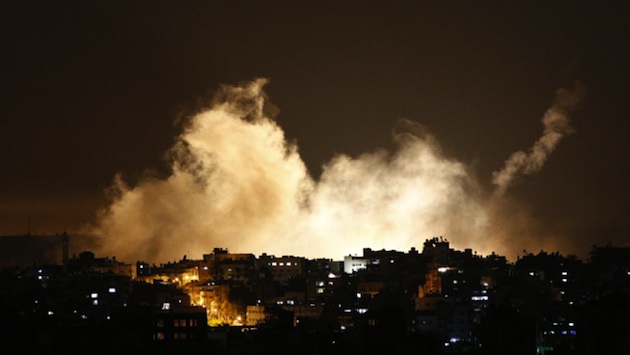

July 17, 2014: Smoke from flares rises in the sky as Israel invades Gaza City, explosions ring out in the northern area of the Gaza Strip. (Photo: AP)
The Israeli military confirmed they sent thousands of troops to invade portions of the Gaza Strip Thursday in an effort to destroy “terror infrastructure” used by Hamas to target the Jewish State.
The army said in a statement late Thursday that after 10 days of Hamas attacks, it had “initiated a ground operation within the Gaza Strip.” The army said the objective was to strike a “significant blow to Hamas’ terror infrastructure,” particularly the underground tunnels used by the terror group to move money, weapons and other supplies.
We know that Hamas terrorists are operating underground, and that's where we will meet them.
— IDF (@IDFSpokesperson) July 17, 2014
The Israeli ground invasion followed a failed attempt by 13 militants to infiltrate Israel earlier Thursday through a tunnel under the Gaza-Israel border. They were stopped in their tracks by an Israeli strike at the mouth of the tunnel.
“The decision of the Israeli army to start a ground invasion in Gaza is dangerous and they will pay back heavily for it,” Hamas spokesman Fouzi Barhom told reporters in Gaza. “Hamas is ready for the confrontation.”
Israeli Prime Minister Benjamin Netanyahu released a statement shortly after the ground invasion began, citing the terror group’s refusal to accept the terms of the Egyptian-brokered cease-fire, as well as their continuous rocket barrage despite a short 5-hour cease-fire that was agreed upon for humanitarian purposes.
“In light of the despicable and relentless aggression by Hamas and the dangerous infiltration into Israel, Israel is obliged to protect its citizens,” Netanyahu said.
Operation “Defensive Edge” will reportedly continue “until its goal is reached: to restore sustainable quiet and calm to the Israeli citizens while severely hurting and dismantling Hamas infrastructure as well as other terrorist organizations in Gaza.”
Israeli military spokesman Lt. Col. Peter Lerner also said that the operation will continue until the mission is completed.
“We will be striking the infrastructure,” he said. “We will be striking the operatives in order to safeguard the civilians of the state of Israel especially issues to do with tunneling, that was exemplified earlier today.”
Israel had called up 48,000 reserve soldiers over the course of the last eleven days, and later Thursday the Israeli Cabinet authorized the military to call up 18,000 more.
Egypt’s efforts to broker a longer-term truce after its initial plan was rejected by Hamas earlier in the week, have failed. Hamas, which assumed control of the Gaza Strip seven years ago, wants several international guarantees. First, Hamas demands the joint Israeli-Egyptian blockade will be eased so they can have access to the Al-Aksa Mosque on the Temple Mount in Jerusalem. But the areas surrendered nearby in 2012 by Israel was quickly turned into a terror safe-haven, resulting in the tunnel system the IDF seeks to destroy now.
It has been grossly under-reported that Hamas was in dire financial straits prior to the outbreak of fighting, because a tight crack down of the blockade by Egypt had stopped cash and weapons from coming into the strip through hundreds of smuggling tunnels under the Gaza-Egypt border. The conditions led many to believe the three kidnapped teenagers were to be ransomed by Hamas, but later killed when it became clear Israeli military raids would be the strategic response by the Israeli government. While both Israeli and U.S. officials have said there was a substantial amount of evidence to show Hamas was responsible, PPD has yet to see evidence of a ransom, though the financial incentive was real and strong.
Second, Hamas demands that Israel will release the Palestinian Schalit prisoners.
The six prisoners were initially freed by Israel as part of an exchange for a captured IDF soldier, but later re-arrested in the West Bank after the group recommenced terrorist activities. Israeli officials said the issue of re-releasing the prisoners was “not up for discussion,” because they are simply too much of a danger to their national security.
The latest violence began following the kidnappings and killings of three Israeli teenagers last month. Their bodies had been discovered in a shallow grave in the West Bank. Then, there was a subsequent kidnapping and killing of a Palestinian teenager in an apparent revenge attack. Israel launched an offensive on July 8, saying it was going to put an end to Hamas rocket fire “once and for all” out of Hamas-controlled Gaza Strip.






